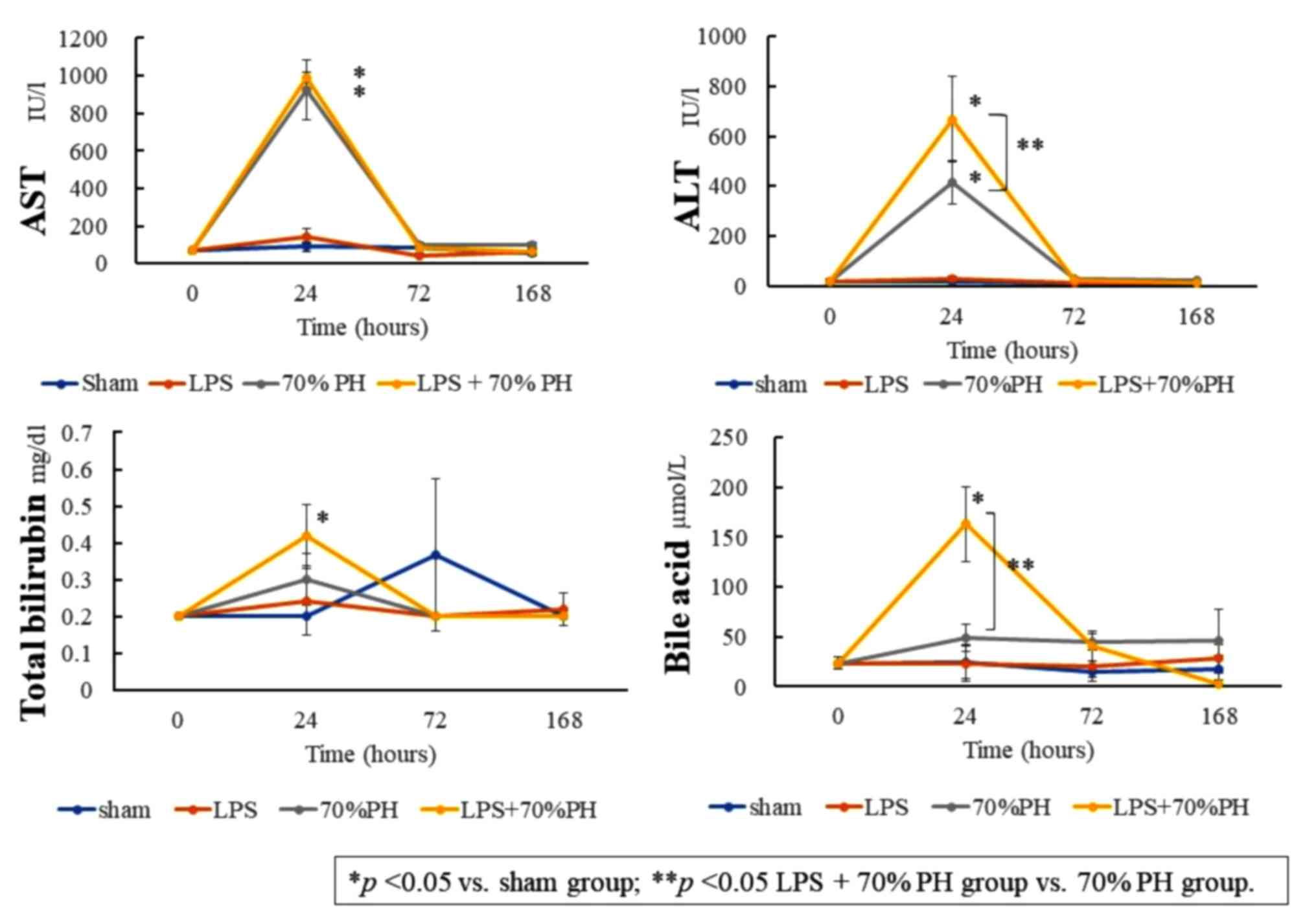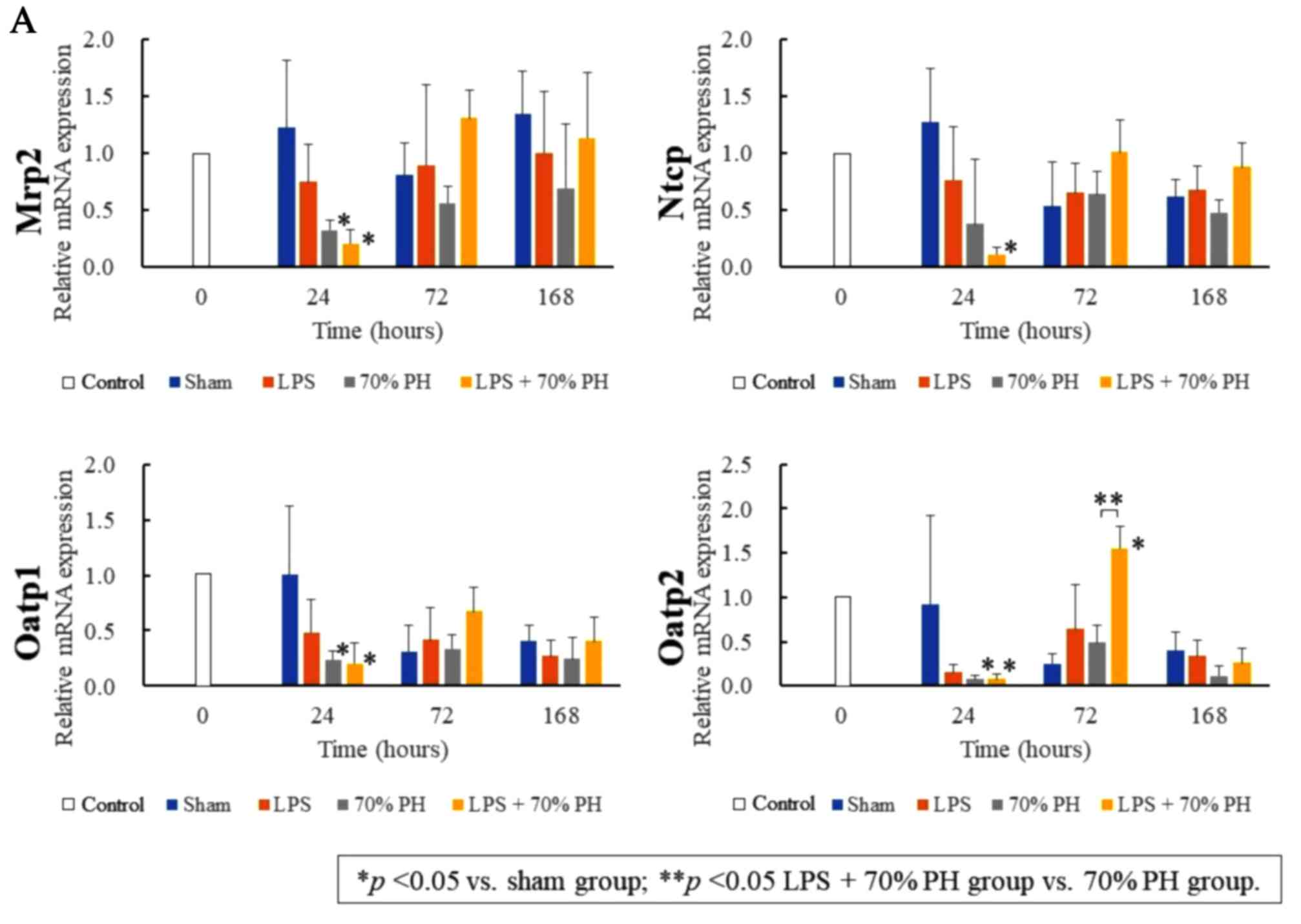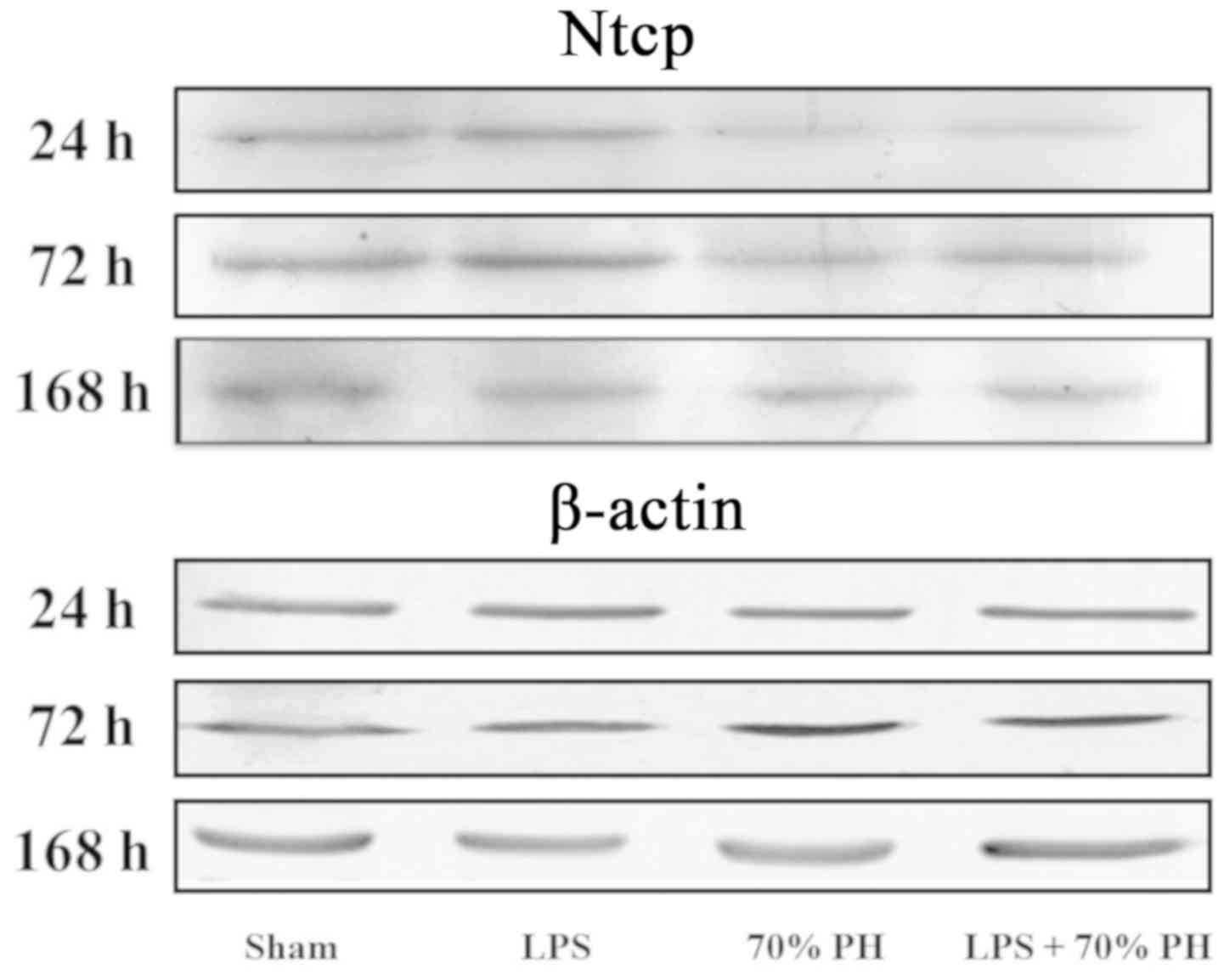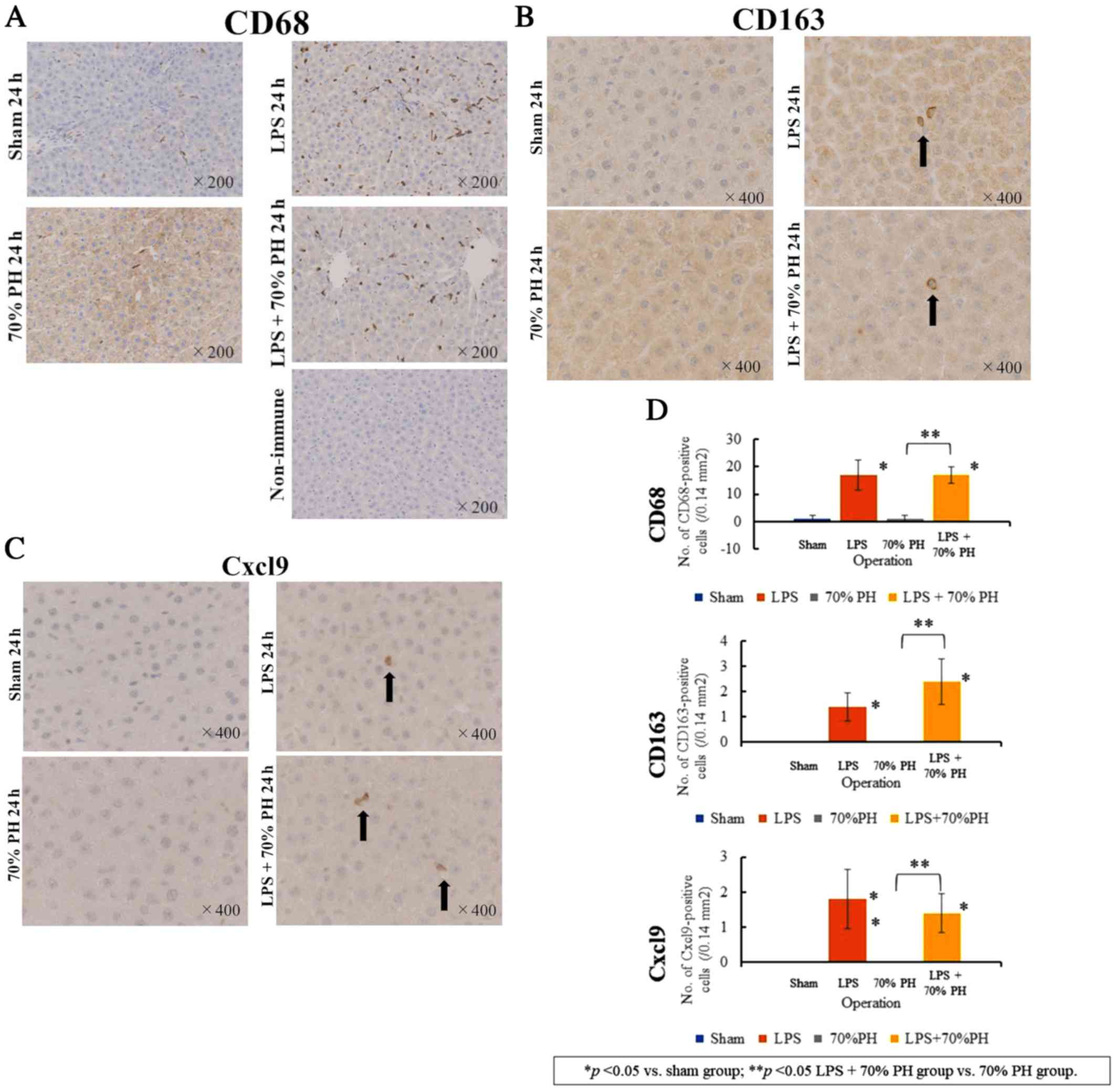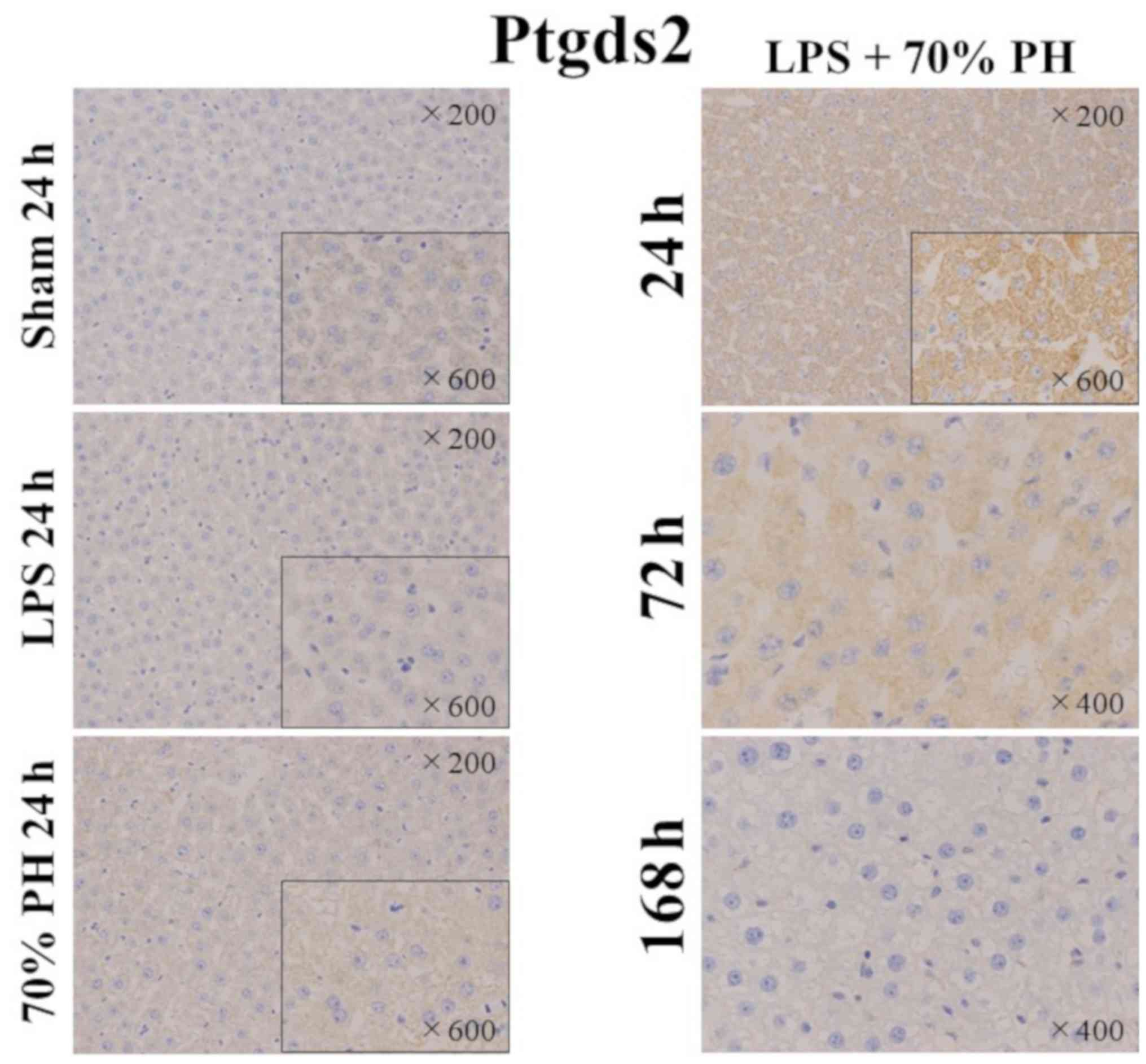|
1
|
Preziosi ME and Monga SP: Update on the
mechanisms of liver regeneration. Semin Liver Dis. 37:141–151.
2017. View Article : Google Scholar : PubMed/NCBI
|
|
2
|
Hu J, Srivastava K, Wieland M, Runge A,
Mogler C, Besemfelder E, Terhardt D, Vogel MJ, Cao L, Korn C, et
al: Endothelial cell-derived angiopoietin-2 controls liver
regeneration as a spatiotemporal rheostat. Science. 343:416–419.
2014. View Article : Google Scholar : PubMed/NCBI
|
|
3
|
Marrone G, Shah VH and Bracia-Sancho J:
Sinusoidal communication in liver fibrosis and regeneration. J
Hepatol. 65:608–617. 2016. View Article : Google Scholar : PubMed/NCBI
|
|
4
|
Mabuchi A, Mullaney I, Sheard PW, Hessian
PA, Mallard BL, Tawadrous MN, Zimmermann A, Senoo H and Wheatley
AM: Role of hepatic stellate cell/hepatocyte interaction and
activation of hepatic stellate cells in the early phase of liver
regeneration in the rat. J Hepatol. 40:910–916. 2004. View Article : Google Scholar : PubMed/NCBI
|
|
5
|
DeLeve LD: Liver sinusoidal endothelial
cells and liver regeneration. J Clin Invest. 123:1861–1866. 2013.
View Article : Google Scholar : PubMed/NCBI
|
|
6
|
Miura T, Kimura N, Yamada T, Shimizu T,
Nanashima N, Yamana D, Hakamada K and Tsuchida S: Sustained
repression and translocation of Ntcp and expression of Mrp4 for
cholestasis after rat 90% partial hepatectomy. J Hepatol.
55:407–414. 2011. View Article : Google Scholar : PubMed/NCBI
|
|
7
|
Cuperus FJ, Claudel T, Gautherot J,
Halilbasic E and Trauner M: The role of canalicular ABC
transporters in cholestasis. Drug Metab Dispos. 42:546–560. 2014.
View Article : Google Scholar : PubMed/NCBI
|
|
8
|
Abad CL, Lahr BD and Razonable RR:
Epidemiology and risk factors for infection after living donor
liver transplantation. Liver Transpl. 23:465–477. 2017. View Article : Google Scholar : PubMed/NCBI
|
|
9
|
Jörger AK, Liu L, Fehlner K, Weisser T,
Cheng Z, Lu M, Höchst B, Bolzer A, Wang B, Hartmann D, et al:
Impact of NKT cells and LFA-1 on liver regeneration under subseptic
conditions. PLoS One. 11:e01680012016. View Article : Google Scholar : PubMed/NCBI
|
|
10
|
Liu H, Liao R, He K, Zhu X, Li P and Gong
J: The SMAC mimetic birinapant attenuates
lipopolysaccharide-induced liver injury by inhibiting the tumor
necrosis factor receptor-associated factor 3 degradation in Kupffer
cells. Immunol Lett. 185:79–83. 2017. View Article : Google Scholar : PubMed/NCBI
|
|
11
|
Meijer C, Wiezer MJ, Diehl AM, Schouten
HJ, Schouten HJ, Meijer S, van Rooijen N, van Lambalgen AA,
Dijkstra CD and van Leeuwen PA: Kupffer cell depletion by
Cl2MDP-liposomes alters hepatic cytokine expression and delays
liver regeneration after partial hepatectomy. Liver. 20:66–77.
2000. View Article : Google Scholar : PubMed/NCBI
|
|
12
|
Edin S, Wikberg ML, Dahlin AM, Rutegard J,
Oberg A, Oldenborg PA and Palmqvist R: The distribution of
macrophages with a M1 or M2 phenotype in relation to prognosis and
the molecular characteristics of colorectal cancer. PLoS One.
7:e470452012. View Article : Google Scholar : PubMed/NCBI
|
|
13
|
Billottet C, Quemener C and Bikfalvi A:
CXCR3, a double-edged sword in tumor progression and angiogenesis.
Biochim Biophys Acta. 1836:287–295. 2013.PubMed/NCBI
|
|
14
|
Liu RX, Wei Y, Zeng QH, Chan KW, Xiao X,
Zhao XY, Chen MM, Ouyang FZ, Chen DP, Zheng L, et al: Chemokine
(C-X-C motif) receptor 3-positive B cells link interleukin-17
inflammation to protumorigenic macrophage polarization in human
hepatocellular carcinoma. Hepatology. 62:1779–1790. 2015.
View Article : Google Scholar : PubMed/NCBI
|
|
15
|
Trivedi SG, Newson J, Rajakariar R,
Jacques TS, Hannon R, Kanaoka Y, Eguchi N, Colville-Nash P and
Gilroy DW: Essential role for hematopoietic prostaglandin D2
synthase in the control of delayed type hypersensitivity. Proc Natl
Acad Sci USA. 103:5179–5184. 2006. View Article : Google Scholar : PubMed/NCBI
|
|
16
|
National Research Council (US) Committee
for the Update of the Guide for the Care and Use of Laboratory
Animals, . Guide for the Care and Use of Laboratory Animals8th.
National Academies Press; Washington, DC: 2011
|
|
17
|
Livak KJ and Schmittgen TD: Analysis of
relative gene expression data using real-time quantitative PCR and
the 2(-Delta Delta C(T)) method. Methods. 25:402–408. 2001.
View Article : Google Scholar : PubMed/NCBI
|
|
18
|
Gant TW, Silverman JA, Bisgaard HC, Burt
RK, Marino PA and Thorgeirsson SS: Regulation of
2-acetylaminofluorene- and 3-methylcholanthrene-mediated induction
of multidrug resistance and cytochrome P450IA gene family
expression in primary hepatocyte cultures and rat liver. Mol
Carcinog. 4:499–509. 1991. View Article : Google Scholar : PubMed/NCBI
|
|
19
|
Bradford MM: A rapid and sensitive method
for the quantitation of microgram quantities of protein utilizing
the principle of protein-dye binding. Anal Biochem. 72:248–254.
1976. View Article : Google Scholar : PubMed/NCBI
|
|
20
|
Hsu SM, Raine L and Fanger H: Use of
avidin-biotin-peroxidase complex (ABC) in immunoperoxidase
techniques: A comparison between ABC and unlabeled antibody (PAP)
procedures. J Histochem Cytochem. 29:577–580. 1981. View Article : Google Scholar : PubMed/NCBI
|
|
21
|
Hebert GA: Ammonium sulfate fractionation
of sera: Mouse, hamster, guinea pig, monkey, chimpanzee, swine,
chicken, and cattle. Appl Microbiol. 27:389–393. 1974.PubMed/NCBI
|
|
22
|
Dixon LJ, Barnes M, Tang H, Pritchard MT
and Nagy LE: Kupffer cells in the liver. Compr Physiol. 3:785–797.
2013.PubMed/NCBI
|
|
23
|
Yovchev MI, Grozdanov PN, Zhou H, Racherla
H, Guha C and Dabeva MD: Identification of adult hepatic progenitor
cells capable of repopulating injured rat liver. Hepatology.
47:636–647. 2008. View Article : Google Scholar : PubMed/NCBI
|
|
24
|
Chang TH, Hakamada K, Toyoki Y, Tsuchida S
and Sasaki M: Expression of MRP2 and MRP3 during liver regeneration
after 90% partial hepatectomy in rats. Transplantation. 77:22–27.
2004. View Article : Google Scholar : PubMed/NCBI
|
|
25
|
Kordes C, Sawitza I, Götze S, Herebian D
and Häussinger D: Hepatic stellate cells contribute to progenitor
cells and liver regeneration. J Clin Invest. 124:5503–5515. 2014.
View Article : Google Scholar : PubMed/NCBI
|
|
26
|
Suzuki S, Nakamura S, Serizawa A,
Sakaguchi T, Konno H, Muro H, Kosugi I and Baba S: Role of Kupffer
cells and the spleen in modulation of endotoxin-induced liver
injury after partial hepatectomy. Hepatology. 24:219–225. 1996.
View Article : Google Scholar : PubMed/NCBI
|
|
27
|
Tacke F and Zimmermann HW: Macrophage
heterogeneity in liver injury and fibrosis. J Hepatol.
60:1090–1096. 2014. View Article : Google Scholar : PubMed/NCBI
|
|
28
|
Aldeguer X, Debonera F, Shaked A,
Krasinkas AM, Gelman AE, Que X, Zamir GA, Hiroyasu S, Kovalovich
KK, Taub R and Olthoff KM: Interleukin-6 from intrahepatic cells of
bone marrow origin is required for normal murine liver
regeneration. Hepatology. 35:40–48. 2002. View Article : Google Scholar : PubMed/NCBI
|
|
29
|
Nishiyama K, Nakashima H, Ikarashi M,
Kinoshita M, Nakashima M, Aosasa S, Seki S and Yamamoto J: Mouse
CD11b+Kupffer cells recruited from bone marrow accelerate liver
regeneration after partial hepatectomy. PLoS One. 10:e01367742015.
View Article : Google Scholar : PubMed/NCBI
|
|
30
|
Asaoka T, Marubashi S, Kobayashi S, Hama
N, Eguchi H, Takeda Y, Tanemura M, Wada H, Takemasa I, Takahashi H,
et al: Intragraft transcriptome level of CXCL9 as biomarker of
acute cellular rejection after liver transplantation. J Surg Res.
178:1003–1014. 2012. View Article : Google Scholar : PubMed/NCBI
|
|
31
|
Lasagni L, Francalanci M, Annunziato F,
Lazzeri E, Giannini S, Cosmi L, Sagrinati C, Mazzinghi B, Orlando
C, Maggi E, et al: An alternatively spliced variant of CXCR3
mediates the inhibition of endothelial cell growth induced by
IP-10, Mig, and I-TAC, and acts as functional receptor for platelet
factor 4. J Exp Med. 197:1537–1549. 2003. View Article : Google Scholar : PubMed/NCBI
|
|
32
|
Farber JM: A macrophage mRNA selectively
induced by gamma-interferon encodes a member of the platelet factor
4 family of cytokines. Proc Natl Acad Sci USA. 87:5238–5242. 1990.
View Article : Google Scholar : PubMed/NCBI
|
|
33
|
Metzemaekers M, Vanheule V, Janssens R,
Struyf S and Proost P: Overview of the mechanisms that may
contribute to the non-redundant activities of interferon-inducible
CXC chemokine receptor 3 ligands. Front Immunol. 8:19702018.
View Article : Google Scholar : PubMed/NCBI
|
|
34
|
Bronger H, Kraeft S, Schwarz-Boeger U,
Cerny C, Stöckel A, Avril S, Kiechle M and Schmitt M: Modulation of
CXCR3 ligand secretion by prostaglandin E2 and cyclooxygenase
inhibitors in human breast cancer. Breast Cancer Res. 14:R302012.
View Article : Google Scholar : PubMed/NCBI
|
|
35
|
Gandhi UH, Kaushal N, Ravindra KC, Hegde
S, Nelson SM, Narayan V, Vunta H, Paulson RF and Prabhu KS:
Selenoprotein-dependent up-regulation of hematopoietic
prostaglandin D2 synthase in macrophages is mediated through the
activation of peroxisome proliferator-activated receptor (PPAR)
gamma. J Biol Chem. 286:27471–27482. 2011. View Article : Google Scholar : PubMed/NCBI
|
|
36
|
Okinaga T, Mohri I, Fujimura H, Imai K,
Ono J, Urade Y and Taniike M: Induction of hematopoietic
prostaglandin D synthase in hyalinated necrotic muscle fibers: Its
implication in grouped necrosis. Acta Neuropathol. 104:377–384.
2002.PubMed/NCBI
|
|
37
|
Mohri I, Aritake K, Taniguchi H, Sato Y,
Kamauchi S, Nagata N, Maruyama T, Taniike M and Urade Y: Inhibition
of prostaglandin D synthase suppresses muscular necrosis. Am J
Pathol. 174:1735–1744. 2009. View Article : Google Scholar : PubMed/NCBI
|















